
Phalangeriformes is a paraphyletic suborder of about 70 species of small to medium-sized arboreal marsupials native to Australia, New Guinea, and Sulawesi. The species are commonly known as possums, gliders, and cuscus. The common name "possum" for various Phalangeriformes species derives from the creatures' resemblance to the opossums of the Americas. However, although opossums are also marsupials, Australasian possums are more closely related to other Australasian marsupials such as kangaroos.
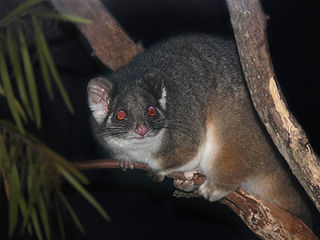
The common ringtail possum is an Australian marsupial. It lives in a variety of habitats and eats a variety of leaves of both native and introduced plants, as well as flowers, fruits and sap. This possum also consumes a special type of faeces that is produced during the daytime when it is resting in a nest. This behaviour is called caecotrophy and is similar to that seen in rabbits.

The Daintree River is a river that rises in the Daintree Rainforest near Cape Tribulation in Far North Queensland, Australia. The river is located about 100 kilometres (62 mi) northwest of Cairns in the UNESCO World Heritage–listed Wet Tropics of Queensland. The area is now primarily a tourist attraction.

Pseudocheiridae is a family of arboreal marsupials containing 17 extant species of ringtailed possums and close relatives. They are found in forested areas and shrublands throughout Australia and New Guinea.

Pseudocheirus is a genus of ringtail possums. It includes a single living species, the common ringtail possum of Australia, as well as the fossil Pseudocheirus marshalli from the Pliocene of Victoria.

The yellow-bellied glider, also known as the fluffy glider, is an arboreal and nocturnal gliding possum that lives in native eucalypt forests in eastern Australia, from northern Queensland south to Victoria.
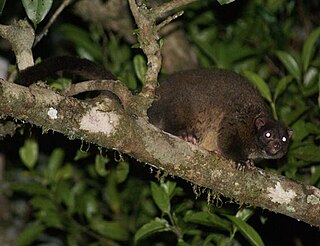
The lemur-like ringtail possum, also known as the lemuroid ringtail possum or the brushy-tailed ringtail, is one of the most singular members of the ringtail possum group. It was once thought that they were gliding possums ; Hemibelideus literally translates as "half-glider". They are similar to lemurs in their facial characteristics, which short snouts, large, forward-facing eyes and small ears, but similar to gliders in their musculo-skeletal adaptations to accommodate a leaping lifestyle. Their long, prehensile tail is a further adaptation to their arboreal habitat.
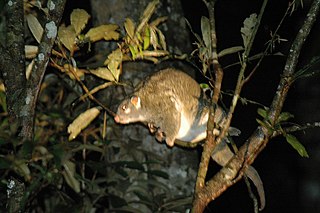
The green ringtail possum is a species of ringtail possum found only in northern Australia. This makes it unique in its genus, all other members of which are found in New Guinea or nearby islands. The green ringtail possum is found in a tiny area of northeastern Queensland, between Paluma and Mount Windsor Tableland.
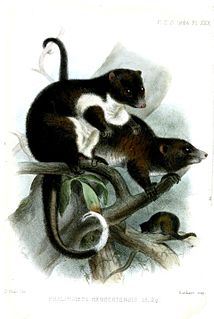
The Herbert River ringtail possum is a species of possum found in northeastern Queensland, Australia. It is a dark brown to black species, sometimes with a white belly. The Herbert River ringtail possum was long considered conspecific with the cinereus ringtail possum, despite the fact that they are very different in appearance. They are, however, the only members of their New Guinea-centred genus found in Australia. The Herbert River ringtail possum is restricted to tropical rainforest from Mount Lee, west of Ingham, to the Lamb Range, west of Cairns.
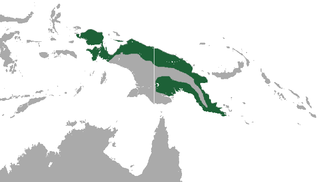
The lowland ringtail possum is a species of marsupial in the family Pseudocheiridae. It's found in Indonesia, the Solomon Islands, and Papua New Guinea.
Slender ringtail possum or Small ringtail possum (Pseudochirulus), also known as the ringtail possum, is a genus of marsupial in the family Pseudocheiridae native to Indonesia, Papua New Guinea and Queensland, Australia. Pseudochirulus live on trees and their diet mainly consists of leaves. The ringtail possums are related to five other genera Hemibelideus, Petauroides, Petropseudes, Pseudocheirus and Pseudochirops.

The painted ringtail possum or moss-forest ringtail possum is a species of marsupial in the family Pseudocheiridae. It is found in Papua New Guinea.
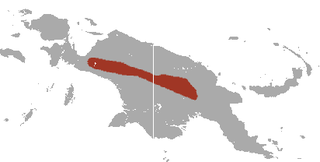
The pygmy ringtail possum is a species of marsupial in the family Pseudocheiridae. It is found in West Papua, Indonesia and Papua New Guinea in montane forest regions. They are "widespread along the Central Cordillera" and live at elevations between 1,500 and 3,600 metres above sea level.”

The Vogelkop ringtail possum is a species of marsupial in the family Pseudocheiridae. It is endemic to the Vogelkop Peninsula, West Papua, Indonesia. It is threatened by habitat loss.

The western ringtail possum or ngwayir refers to a species of possum, Pseudocheirus occidentalis, found in a small area of Southwest Australia. They are a cat-sized marsupial with a stocky build, dark greyish-brown fur, pale underparts and a long prehensile tail with a whitish tip. Ngwayir forage at night through the upper canopy of trees, feeding on young leaves, flowers and fruit, especially in groves of the weeping peppermint Agonis flexuosa. Breeding occurs mainly during the winter, the single juvenile emerging from the pouch after about three months. The population has declined by more than 95% since British settlement, due to clearing of habitat, fire and the introduction of the red fox Vulpes vulpes, and is classified as Critically Endangered. The population in most areas has catastrophically declined or become locally extinct, but strongholds remain in the urbanised areas near Busselton and Albany.
Ringtail, ring tail, or ring-tail may refer to:

Petauroidea is a superfamily of marsupials from Australia and New Guinea. It is part of the suborder Phalangeriformes within the order Diprotodontia, which also includes, among others, wombats, kangaroos, cuscuses. The superfamily Phalangeroidea, including cuscuses and brushtail possums and pygmy possums, is the immediate sister group of the Petauroidea.

The masked ringtail possum is a marsupial possum of the family Pseudocheiridae. It is found in northeastern New Guinea in the Star Mountains. the eastern Central Cordillera, the Huon Peninsula and the northern coast ranges. Masked ringtails are arboreal residents of various forest ecosystems. They are sexually dimorphic and locally common. This species is sometimes classified as a subpopulation of P. forbesi; however, it has a separate range.
















